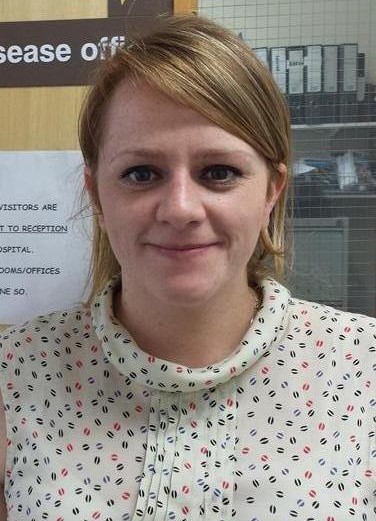Publish date: 11 April 2022
To mark Parkinson’s Awareness Day Katherine Taylor tells us more about her role as a Parkinson’s nurse specialist

Hi my name is Katherine Taylor and I’m a Parkinson’s nurse specialist working as part of a team of seven nurses supporting people with Parkinson’s in North Tyneside and Northumberland. Parkinson’s is a condition of the brain that progresses overtime. There are over 40 symptoms of Parkinson’s but the main three are tremor, stiffness and slowing down. In my role I am with my patients from their diagnosis for the rest of their lives, helping to support them and manage their Parkinson’s journey. Everyone will experience Parkinson’s differently which means my job is never boring or predictable.
I have been working as a Parkinson’s nurse specialist for eight years now. Prior to this I worked in emergency care so this was quite a change for me! At first my Parkinson’s knowledge was limited, but the team around me has been so supportive, helping me to learn and develop. One of the best things about my role is that there are lots of opportunities for personal and professional development and education is really encouraged.
When Covid hit we introduced telephone and video consultations so that we could still deliver care to our patients. We received some lovely feedback from a patient living in rural Northumberland who, using videos consultations, was able to access support without the difficult journey to the clinic. Having more options available for patients to access care in a way that suits them has been, and continues to be really beneficial.
We are always involved in research and development around Parkinson’s and are excited to be involved in a new research project involving wearable technology to help prompt people with drooling issues to swallow, hopefully positively impacting their quality of life. Parkinson’s patients are vastly increasing in numbers worldwide and I see the service continuing to develop in order to meet this demand. There are new treatments being researched all the time, such as drug repurposing and personalised medicine. It will be interesting to see how we change our management of Parkinson’s as new treatments and technology are developed.
What I enjoy most about my role is that it’s full of variety – no two days are the same and the opportunities for development are fantastic and so rewarding. However, it’s the patients that make my job what it is. They are from all walks of life, as Parkinson’s does not discriminate, making it very interesting. Our patients are all fantastic people. Working with and getting to know them and their families over the years is such a privilege. Parkinson’s can be a difficult area to work in as it is a progressive condition meaning our patients will continue to decline over time. However, there are times when the intervention we provide makes such a positive difference to someone’s quality of life and the reward of seeing that feels amazing.
